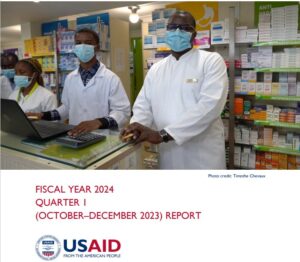Improving pharmaceutical-sector financing in low- and middle-income countries (LMICs) is essential to ensuring universal access to pharmaceutical products and services. In many LMICs, pharmaceuticals are primarily financed through direct out-of-pocket payments by individuals and households, but this source of financing is both inefficient and inequitable. At the same time, between 20% and 40% of health expenditures in LMICs are estimated to be wasted (according to a WHO report), and in the pharmaceutical system this is seen in the form of expiries; poor financial management; misaligned provider incentives; inefficient medicine selection; and outdated procurement, pricing, reimbursement, and distribution practices. As countries expand essential health coverage within resource-constrained environments, sustainable and equitable access to effective, safe, quality-assured, and affordable treatments, diagnoses, and services requires countries to have a well-functioning national pharmaceutical financing system with the capacity to mobilize, allocate, and use resources in a timely manner.
USAID supports strategies to improve pharmaceutical-sector financing, including resource mobilization, allocation, and use. The 2017 Lancet commission report on essential medicines and universal health coverage (UHC) estimated that between USD 77.4 and 151.9 billion (or USD 13 to 25 per capita) is required to finance a basic package of 201 essential medicines (378 dosage forms) in all LMICs. To reduce out-of-pocket expenditures and adequately fund essential medicine packages and the country systems needed to manage them, countries need to use evidence to generate political will to allocate more resources to health, enhance financial management and expenditure analysis so resources can be mobilized efficiently, and undertake reforms to avoid waste and improve disease management and system outcomes within existing resources.
USAID MTaPS supports countries to achieve local health system financing objectives and the global sustainable development goal of improving access to essential medicines and health technologies by focusing on five core strategies:
- Align pharmaceutical-financing strategies with overall health system objectives
- Strengthen country systems for efficient pharmaceutical resource allocation and use
- Improve the availability and use of evidence-based medicines financing strategies and pharmacy benefits programs
- Adopt viable approaches to reduce financial barriers to access to medicine
- Strengthen in-country capacity to mobilize additional and sustainable resources
MTaPS helps countries:
- Ensure that their pharmaceutical financing system is aligned with overall health system objectives and health financing strategies
- Determine appropriate pharmaceutical financing schemes based on country context and stakeholder engagement to increase affordability of medicines
- Leverage strategic purchasing interventions to adequately incentivize use of priority medicine, technologies, and pharmaceuticals where appropriate to optimize current health spending
- Conduct pharmaceutical financing analyses of sources, revenue collection, purchasing, policy/regulations, and financial processing barriers to inform policy and management decisions for the health system
- Build capacity to align pharmacy benefits programs with resource availability, including capture of financial data, modelling, visualization, utilization reviews, and formulary updates
- Develop and test guidelines for the design and costing of medicines packages as part of essential services defined in the context of broader UHC objectives
- Support the institutionalization of evidence-based priority-setting activities for medicines and other health technologies, including health technology assessments where applicable
- Transition the financing of medicine supplies from donor support to domestic funding, including developing competitive local and international procurement processes and establishing strategic and group purchase mechanisms to improve integration within the health system’s broader benefits package
- Develop and implement strategies for financing and optimizing malaria, HIV, and TB health programs to ensure that commodities are covered by both public and private health insurance schemes when appropriate
- Conduct capacity-building courses on pharmaceutical financing, health technology assessments, and public pharmaceutical-sector financial management
- Mobilize stakeholders and build coalitions, including the private sector, to improve financing, governance, policy analysis, advocacy, and consensus building for strengthening pharmaceutical financial management systems for expanded coverage of services
- Improve the availability of information on pharmaceutical expenditures for decision making and include medicine, technology, and pharmaceutical spending in national public and private expenditure tracking systems to help governments achieve greater transparency and accountability in the financing and management of pharmaceuticals
Key Resource for Evidence-Based Priority Setting
Moving LMICs Toward Self-reliance: A Roadmap for Systematic Priority Setting for Resource Allocation
Download MTaPS Financing factsheet
For more information, contact:
Senior Technical Advisor, Finance
Christian Suharlim
[email protected]
